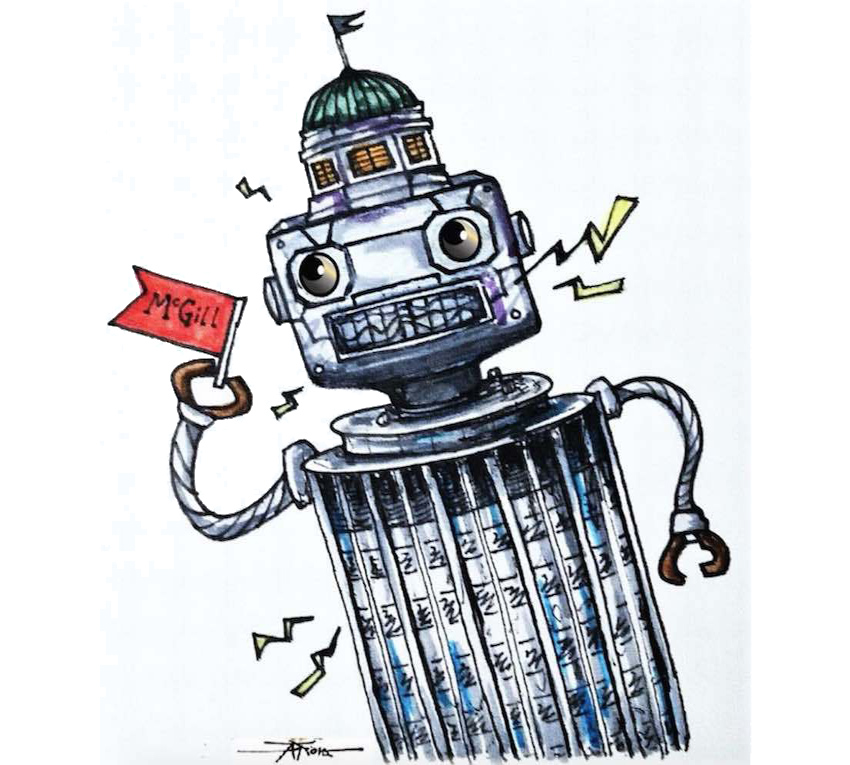The McGill Office for Science and Society hosted the 2018 Trottier Public Science Symposium on Oct. 29 and 30, where academics discussed information technology and its implications for humanity.
Human history is punctuated with moments which completely redefined technology, the latest being the Fourth Industrial Revolution. Beginning during World War 2, the revolution saw the inception of artificial intelligence (AI) and genome editing. Alan Turing, the revered mathematician, sparked the revolution when he developed the first computer to decipher coded messages sent by the German Enigma machine during WW2. Building upon Turing’s computer, it took just twenty years to downsize the ENIAC, the world’s first digital computer, and fit its capabilities into a tiny silicon chip. Technology continues to advance at a rapid rate, and while some are ecstatic for what it holds, others fear that we risk creating something we cannot control.
This fear is most relevant to the rise of AI. Rather than enhancing humans’ physical abilities, AI, unlike other technologies, promises to boost our cognition and, consequently, raises uncomfortable questions about consciousness and identity.
Doina Precup, associate professor in McGill’s School of Computer Science, shared her fascination with systems that can learn independently and even outcompete humans. With the rise of big data, there is a wealth of information about everything from business to healthcare, and it would take more processing power than humans are capable of to analyze it all.
“There’s really a deluge of many different kinds of data that are on the Internet and that we’d like to make sense of, and it turns out that we have the computing power now to do that,” Precup said.
Machine learning is a branch of AI specialized in conducting data analysis and learning from it. Machine learning can be applied to develop technologies such as self-driving cars and fraud detection.
“AI does not exist in a vacuum,” Precup said. “It exists in a social context, and we need to figure out a way to deal with this.”
Technology occupies a crucial place in human evolution. Cameron Smith, an adjunct assistant professor of anthropology at Portland State University, explained that humans have consistently used tools to adapt and disperse. Technologies to advance transportation have largely characterized the past two million years of human history—from the sailing vessels used by the prehistoric Lapita peoples of Polynesia to the spacesuits designed for travelling beyond Earth’s atmosphere, a project that Smith is working on in his Pacific Spaceflight lab.
But, the same technology that makes Smith’s spacesuit research possible also leads to privacy issues. As devices become increasingly ingrained into everyday life, so, too, has the collection and sale of user data.
As a result, AI technology is perpetuating concerns over data privacy. Moreover, dealing with personal data becomes even more complicated when robots, rather than humans, are analyzing it. According to Ian Kerr, Canada Research Chair in Ethics, Law, and Technology, the privacy issues surrounding AI are difficult for lawyers to handle because privacy regulation typically deals with relationships between people. Current legislation is inadequate since robots, which were once simply extensions for humans, are now capable of acting independently.
“Privacy law sees […] a binary between [being a] toaster and a person,” Kerr said. “And, so, if [something is] not a person, [there are] no privacy implications. Everything is just as much a toaster.”
For Kerr, this binary way of dividing organic and machine thinking is insufficient. Instead, he argues that there ought to be a continuum. Cognizance is not simply a trait of humans; robots are also capable of invading privacy.
According to Precup, artificial superintelligence is still out of reach, so robots won’t be taking over the world anytime soon. Still, privacy doctrine today only accounts for humans and is thus ill-prepared for a high-tech world. As artificial minds enter reality, humans should keep watch through law and policy.








